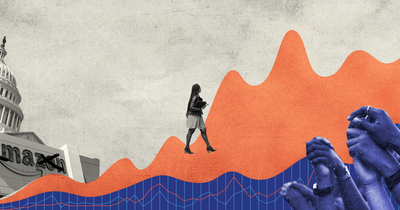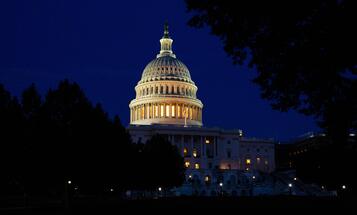
Economic Democracy: Framing the Future
Our new Economic Democracy agenda is about building economic power and liberation for Black and brown people in the United States.

In college, I chose to major in economics after taking my first microeconomics course. This was at the height of the Freakonomics craze, during which simple economic models designed by often-contrarian but technically-proficient experts were said to explain every aspect of civic and economic life clearly and dispassionately. I was drawn to the field’s promotion of critical inquiry, and the idea that technical expertise and the right model could explain and address the racialized inequality I saw in my community growing up.
In the 15 years since, we’ve lived through 2 global recessions, the proliferation of digital media and rise of Big Data, a nearly decade-long racial reckoning, an incredible number of climate disasters, and a once-in-a-century pandemic that shocked the world to a standstill. Witnessing these events and the institutional failures that precipitated them in real time forced me to confront the shortcomings in my own understanding of those institutions. The technical expertise and models I lionized created the conditions I was working to repair, and rather than learning from mistakes and reversing course, the decisionmakers heading our institutions doubled down on the policy decisions that led us to crisis. The result was the further entrenchment of an exploitative, racialized, hyper-capitalist order that simple technical or behavioral fixes can never undo.
Reading the work published by the research and policy experts at Demos informed the evolution of my thought, from college to now. For 2 decades, through its legal and political advocacy in support of protecting and expanding American democracy, Demos has provided the conceptual building blocks upon which we can better understand this moment of institutional crisis. Heather McGhee’s insightful, forward-thinking economic justice framework forced the political class to confront the role that race and class play in informing policy decisions, and the cyclical way those decisions reinforce economic exploitation across racial lines. K. Sabeel Rahman’s incisive analysis revealed how consolidated economic and political power among a billionaire class of corporate elites results in racialized castes, social unrest, and anti-democratic outcomes. Now, under the leadership of Taifa Smith Butler, who became president of Demos in July, the organization is primed to advance a deeper understanding of the inseparability of our economy and our democracy.
I joined Demos this past April to help create our Economic Democracy program—a bold new framework for building economic power and liberation for Black and brown people in the United States. The growing concentration of power among a small class of mega-billionaires threatens the country's stability and security. Our politics, economy, and institutions are governed by these new-age “robber barons”: plutocrats who leverage public investment to amass wealth, crush small business, and depress wages, then hoard that wealth and income through tax avoidance and stock buyback practices. Repairing our institutions requires an approach that centers economic democracy—the notion that the people, the governed demos, can and should have more control over the institutions and economic forces that shape their lives.
Economic democracy prioritizes the deconcentration and redistribution of power over our economy from the billionaire financier and monopolist class to the multi-racial, multi-ethnic majority.
Our current economic order was built upon the exploitation of Black and brown people. Economic democracy prioritizes the deconcentration and redistribution of power over our economy from the billionaire financier and monopolist class to the multi-racial, multi-ethnic majority.
Demos’ approach to building a stronger, more democratic economy is threefold:
- Break apart and regulate the new corporate powers like Amazon, Google, and Facebook, and invest in a stronger, more diverse set of public options. Today’s billion-dollar corporations aim to monopolize every market, privatize every service, and own the future in the most literal sense by harvesting the personal information of every person to feed predatory algorithmic models that reinforce unequal racial, gender, and economic standards—whether that person chooses to engage with that platform or not. This amount of reach and power demands regulation and public accountability, and establishing big data and tech companies as public utilities would allow for greater public oversight. Grassroots movements and organizational coalitions like Athena, Data For Black Lives, and La ColectiVA are actively working to constrain tech monopolists, to deprivatize essential public services, and to restore power and autonomy to the workers and communities targeted for exploitation by those monopolists.
- Expand the definition of essential public goods, and create equitable public options that account for the vital roles that water, energy, domestic care, finance, tech, and voting access play as the scaffolding that supports the basic function of our modern society. A national movement centered on public banks has gained traction, suggesting widespread public support for the democratization of capital. Coalitions and groups like Caring Across Generations, the New Economy Project, and the Partnership for Working Families are advocating for new public infrastructure models that are designed with the needs and input of Black and brown people at their center. Not only would this include breaking apart and regulating the Big Data corporate surveillance system or the concentrated power of “Too Big To Fail” banking monopolies, but imagining and establishing new services that will protect the general public from corporate and government overreach and guarantee widespread access to our most essential needs.
- Build civic power over economic forces through co-governance. Organizations like Jobs with Justice and United for Respect have pioneered negotiation models, like Expanded Bargaining, that allow labor to better build and share power throughout the economy, from the workplace to the housing and credit markets. Others, like the Texas Organizing Project and Urban Habitat’s Boards and Commissions Leadership Institute, support the creation of inclusive community oversight institutions that bolster the political and economic decision-making power of Black and brown communities. And coalitions like Democracy Beyond Elections and the U.S. Solidarity Economy Network are promoting community-led budgeting, policy, and economic models throughout the United States.
Through continuous engagement with movement partners, including members of Demos’ Inclusive Democracy Project, our Economic Democracy agenda will develop and amplify inventive models for making our social, political, and economic institutions fully democratic. Over the coming months, Demos will continue to release blog posts, newsletters, graphics, and other resources that will clarify and develop our Economic Democracy framework.
Later this fall, we’ll also launch a series of case studies that demonstrate what Economic Democracy looks like in practice, and share the next steps of this expansive vision. And we’ll continue to fulfill Demos’ role as the “think tank of the movement” by bringing together several of our grassroots partners through an advisory board, ensuring that the grassroots’ needs, guidance, and vision shapes our Economic Democracy work as it evolves.
We’re excited to begin this new phase of policy, research, and movement building at Demos, and we hope you join us in imagining and building a future that is led by our country’s Black and brown communities and lives up to the American promise. Together, we can ensure that the core tenets of democracy—self-determination through community governance and collective economic power—are guaranteed, valued, and protected.




